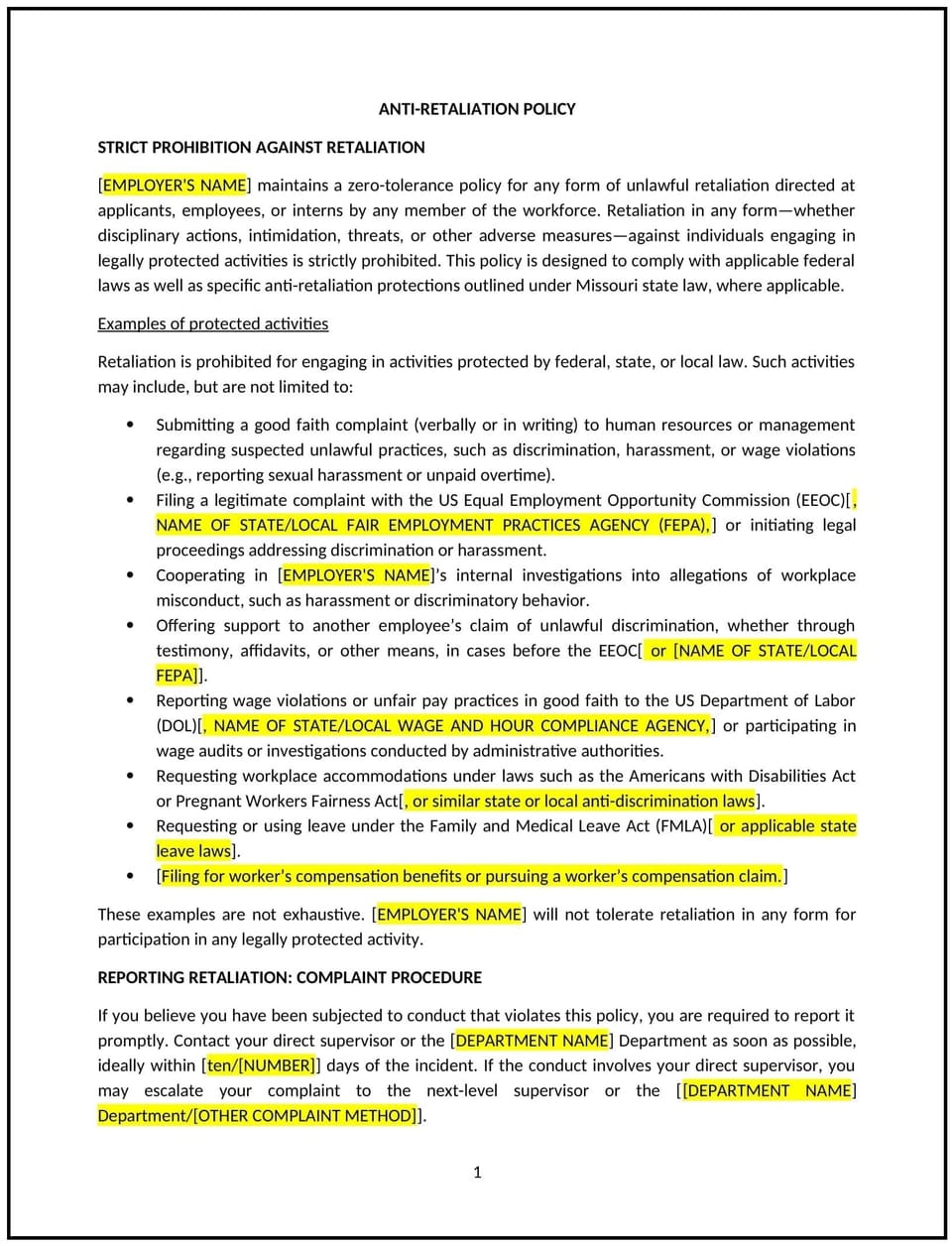Anti-retaliation policy (Missouri): Free template

Anti-retaliation policy (Missouri)
An anti-retaliation policy helps Missouri businesses protect employees who report misconduct or exercise their legal rights. This policy ensures that employees can raise concerns without fear of retaliation, such as discrimination, harassment, or punitive actions, in line with Missouri’s commitment to fair treatment and safeguarding employee rights.
By adopting this policy, businesses in Missouri can foster an open and transparent work environment, encourage employees to report issues, and promote a culture of trust and fairness.
How to use this anti-retaliation policy (Missouri)
- Define retaliation: Clearly outline what constitutes retaliation, including demotion, termination, harassment, or any adverse action taken against an employee for exercising their rights.
- Set reporting procedures: Detail the process for employees to report concerns about retaliation, including who to contact and how to submit complaints.
- Promote confidentiality: Ensure that employees’ reports are kept confidential and that retaliation is prohibited at all stages of the reporting process.
- Establish protection from retaliation: Clarify that any employee who reports misconduct or participates in investigations is protected from retaliation.
- Encourage prompt reporting: Encourage employees to report concerns about retaliation as soon as possible to address issues before they escalate.
- Provide training: Train managers and supervisors on how to handle complaints and protect employees from retaliation.
- Monitor the effectiveness of the policy: Periodically assess how well the policy is being implemented and whether employees feel comfortable reporting issues without fear of retaliation.
- Enforce consequences for retaliation: Outline the disciplinary actions that will be taken against any employee who retaliates against others.
Benefits of using this anti-retaliation policy (Missouri)
Missouri businesses can benefit from this policy in several ways:
- Promotes a transparent workplace: Encourages employees to report misconduct and participate in investigations without fear of negative consequences.
- Reduces legal risks: Helps protect the business from legal actions related to retaliation claims.
- Supports a fair work environment: Ensures all employees feel safe to voice concerns or report wrongdoing.
- Encourages ethical conduct: Reinforces the business’s commitment to ethical standards and promotes accountability.
- Fosters trust in management: Employees are more likely to trust the company’s leadership when they feel safe from retaliation.
- Aligns with Missouri labor laws: Reflects Missouri’s legal framework for protecting employees from retaliation.
Tips for using this anti-retaliation policy (Missouri)
- Ensure that the policy is communicated clearly to all employees, especially new hires.
- Provide accessible reporting channels, such as a dedicated hotline or HR contact.
- Encourage employees to report retaliation concerns as soon as they arise to prevent escalation.
- Offer training for managers and supervisors on handling retaliation complaints and maintaining confidentiality.
- Regularly review the policy’s effectiveness and make adjustments as needed.
Q: Why should Missouri businesses adopt an anti-retaliation policy?
A: Businesses should adopt this policy to promote a transparent and fair workplace, encourage employees to report concerns, and protect them from retaliation.
Q: What constitutes retaliation in the workplace?
A: Retaliation includes actions such as demotion, termination, harassment, or any adverse treatment directed at an employee for reporting misconduct or participating in investigations.
Q: How should businesses handle retaliation complaints?
A: Businesses should provide clear reporting channels, investigate complaints promptly, and take appropriate actions to prevent further retaliation.
Q: How can businesses prevent retaliation in the workplace?
A: Businesses should create a culture of trust by protecting employees from retaliation, providing confidential reporting options, and training managers to handle complaints appropriately.
Q: How often should businesses review the anti-retaliation policy?
A: Businesses should review the policy annually or whenever there are changes to relevant laws or company practices.
This article contains general legal information and does not contain legal advice. Cobrief is not a law firm or a substitute for an attorney or law firm. The law is complex and changes often. For legal advice, please ask a lawyer.


